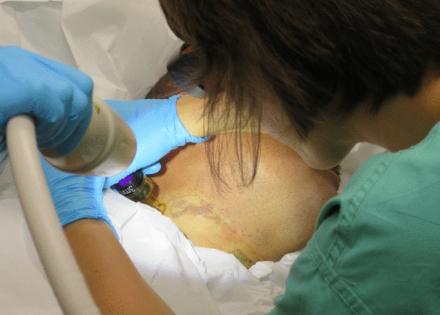Medical students change lives -- and get crucial experience -- in tattoo removal program
Published in Health & Fitness
SAN DIEGO -- Since she was a child, Maya Shetty knew she was going to be a doctor.
She wanted to follow in the footsteps of her parents, who are both primary care physicians in West Virginia. And she wanted to use her future career to help underserved populations that oftentimes fall through the medical system’s cracks.
So, as a first-year medical student at UC San Diego, she and five classmates jumped at the opportunity to volunteer for their school’s new Clean Slate Free Tattoo Removal Program. The unique program at UCSD puts medical students in front of patients and in clinics as early as their first year.
Started in 2016, the program has utilized volunteer dermatologists to help those impacted by the criminal justice system improve themselves, officials said. But a recent growth in the volume of patients being treated at the clinic, as well as the number of medical students expressing interest in service-learning activities, pushed administrators to create the new volunteer program in 2023 to improve the clinic’s flow and support student learning, officials said.
Shetty said medical students with her level of experience are not traditionally working directly with patients and doctors, at least for a few years. The program has already taught them how to build relationships with patients and develop skills early on in a clinical setting — regardless of whether they end up pursuing dermatology as a specialty, she said.
And while the students build their credentials, the patient — who might not have previously been able to afford the tattoo removal — takes another step toward a better future free of cost.
“Historically, tattoos have not had a very positive image,” said Victoria D. Ojeda, a professor at the UC San Diego School of Medicine and the Herbert Wertheim School of Public Health & Human Longevity Science. “Some of our clients are looking to make a change in what other people may see about them.”
Ojeda, who runs the removal program, said people come in because their tattoos are creating boundaries, whether it be socially or economically.
For instance, some clients are looking for employment or to improve their financial status and are told they will be hired or promoted if they remove the tattoo.
Others are attempting to distance themselves from certain criminal organizations, such as gangs that they are no longer a part of. Officials said they have not had any patients come for tattoo removal over fear of immigration enforcement or deportation, but recent federal policy and national headlines have put the stigma associated with tattoos back in the limelight.
“They’re trying to remake their lives,” Ojeda said. “They can also have tattoos that might not be perceived well, but they have no actual affiliation.”
According to a study published by Rutgers University in 2019, 81% of minors involved in gangs have tattoos, and those youths had a 162% greater risk of being re-arrested within 12 months compared to youths without tattoos.
The program now has eight students — including two medical students who were part of the original cohort a year before Shetty — and they all assist with one to 13 laser removal sessions over multiple months, officials said.
By helping a formerly incarcerated person remove a tattoo that represents a past version of themselves, Shetty said the clinic helps remove some of the stigma they face in everyday life.
“There’s just a lot that people go through that you won’t necessarily know unless you ask or have the time to listen,” Shetty said. “The program has opened my eyes … I think everyone should have an equal opportunity at a fresh start.”
According to Ojeda, the tattoo removal process, which usually involves laser removal and multiple appointments over many months, can be expensive.
Ojeda said people who apply start by explaining how they’ve been impacted by the criminal justice system and what tattoos they’d like removed. If the applicant fulfills the criteria and is selected, they will be contacted by the clinic to begin setting up their first appointments, officials said.
The clinic operates one Saturday per month and serves approximately 25 patients each session, officials said.
©2025 The San Diego Union-Tribune. Visit sandiegouniontribune.com. Distributed by Tribune Content Agency, LLC.










Comments